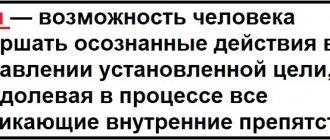As part of a social group, each person occupies a certain place in the group hierarchy. This place is called social status. Even if the society is informal and, it would seem, does not have a clear structure and hierarchy, the members of this society still have different “weight”, authority, attractiveness, level of power, etc. Differences in status play an important role in the organization of interpersonal relationships and in the existence of the group.
What is social status
This concept in social psychology is close to such categories as authority, prestige, role, but it does not coincide with them in meaning and has significant differences. Social status is the position that a person occupies in society. It is, on the one hand, determined by his personal qualities, on the other, by the functions that the individual performs in the group.
Social status as a reflection of a person’s individual and personal characteristics
The main factor determining a person's position in the group hierarchy is his attractiveness to others. It is not associated with external, superficial features, but with those qualities that determine the level of usefulness of the individual for the group. Thus, a kind and sympathetic person may have a low social status because he is too timid and lacking initiative or lazy and likes to shift responsibility to others. And on the contrary, an individual’s self-confidence, activity, and interest in the affairs of the group increases his status.
In different societies, status may depend on different personality traits. For example, in professional teams, specialized knowledge and skills are of paramount importance. In informal communities of teenagers - self-confidence, courage and loyalty to the group; in the family - the ability to care for others, willingness to support, etc.
Status and social roles
An individual's role behavior plays an important role in the formation of social status. A role is a function of a person in a group, which includes a set of stereotypes of role behavior, responsibilities and human rights. A role is not a status, although it can influence it. And different roles may occupy different places in the group hierarchy. But at the same time, people playing the same roles in a group have different statuses. For example, students in a class, children in a large family, office employees - the role is one, but the statuses are different.
However, the formation of social status is influenced by how a person performs his functions, that is, plays the role assigned to him in the group. Therefore, it often happens that in an informal group hierarchy the boss has a lower status than one of his subordinates.
Social status and authority
Authority in psychology is understood as the level of influence a person has on other members of the group. Authority can be formal and depend on the individual’s position. For example, a boss always has formal authority and has levers of power and control, which are also of a formal nature. He can give or deprive a bonus, assign a vacation at a time convenient or inconvenient for a subordinate, demote or promote him in position, etc.
Informal authority is associated with status, with the position that an individual occupies in the group hierarchy. High-status individuals often have greater authority and real power than officially appointed officials. Because their right to power and control is based on the respect and support of other group members.
The role and status of the individual in the group
⇐ PreviousPage 10 of 20Next ⇒
The nature and characteristics of relationships between individuals in the process of active interaction, activity and interpersonal communication in groups are analyzed in modern social psychology using the concepts of “role and status”. The introduction of these terms into science in connection with the development of the categorical apparatus of social psychology of personality, as N.D. Levitov noted, made it possible to make a number of personal qualities the object of empirical research, translating the concept of “personality” into some “equivalents” accessible to experimental research - the system social and interpersonal roles.
Back in 1936, R. Linton put forward the idea of the possibility of creating models of behavior of individuals in a group in various situations. To build models, he proposed introducing the concepts of “status” and “role”. status as a collection of rights and responsibilities of an individual, and role as a dynamic aspect of status. When an individual exercises rights and responsibilities in accordance with the social expectations of groups, he fulfills a role.
Thus, a role denotes the realized behavior expected from a particular person in specific situations of activity when interacting with other members.
R. Linton's consideration of status and role became a kind of milestone in the development of Western social psychology. The works of R. Linton met with the approval of bourgeois psychologists, and the theory of role as a unique model (template) of behavior was widely developed in the works of his followers (T. Sarbin, N. Gross, V. Mazon, A. Hare, T. Newcome).
Attention and interest in the problems of socialization of the individual, especially in the study of the mechanisms of interaction between the individual and society, have led sociologists and psychologists to the need for a more in-depth study of the influence of social and social factors on the behavior and self-awareness of the individual. In this regard, it turned out that “role” and “status” could not be more successfully and adequately used to describe and explain various aspects of the complex process of formation and development of personality in the system “individual - group - society”, which was called "personal socialization".
(In social psychology, socialization is understood as a complex multi-level process of the formation of the basic personal qualities of an individual, necessary for him to function in society. The theory of socialization considers under the influence of what social factors certain personality traits are formed, the mechanisms of this process and the possibility of purposeful management of it.) In addition Moreover, it was revealed that the various stages of the formation and dynamics of a person’s self-awareness can also be explained and understood in the socio-psychological context that is associated with the definitions of the concepts of “role” and “status”.
The further development of role theory, as a “peculiar model of behavior”, “programmed” at the level of the social system of society, was significantly influenced by the work of psychologists and sociologists of the USSR and other socialist countries.
The revival of interest in role theory, which is currently observed, is certainly associated with serious theoretical and experimental research carried out in recent years by E. A. Anufriev, E. V. Belyaev, A. A. Bodalev, I. S. Kon, N V. Novikov, B. D. Parygin, R. X. Shakurov, D. N. Shalin, G. Gibsch, M. Forverg, J. Shchepansky, etc. It is their work that allows us to overcome the simplified approach to the study of these phenomena and gives the opportunity, in the light of Marxist methodology, to pose and solve the most important problems of socialization of the individual on a truly scientific basis. They made attempts to describe the behavior and relationships of an individual with other people in terms of the social roles performed by the individual.
Roles, determined at first glance by various subjective factors, are actually “set”, determined by the nature and characteristics of the system of social relations existing in a given society - this is one of the most important conclusions of Marxist social psychology, which we find in the works of the above-mentioned authors.
Social status characterizes a person’s position in society. Typically, status is understood as the position of an individual, defined in terms of rights, responsibilities and privileges. Prestige, powers, rewards - these are the components of the social status of each individual.
Peculiar symbols of an individual’s social status in the eyes of the people around him may be his position, title, salary, the number of books read or the presence of a personal library, the size of the apartment he occupies, access to sources of information, residence in a certain area of the city, etc. Naturally that in the modern world, divided into two parts by opposing social systems, there are different “prices” and different “weights” of these symbols in the eyes of representatives of different social groups and classes.
Thus, in the USA, a person’s position in the world, his social status is determined from the point of view of capitalist ideology by the following main factors: income, ethnicity, and occupation. It is easy to notice that the initial principle, when identifying and selecting the main symbols of status, propagated and imposed by the media of capitalist countries, ignores one of the most important laws of social development, which ultimately determines the position, the essence of a person’s status in the modern class world - the attitude towards means of production, the degree of participation in the production of material and spiritual goods of society.
In contrast to the capitalist world, in our socialist society, where citizens constitute a single historical community, a person’s prestige, the totality of his rights and responsibilities are determined primarily by the place he occupies in social production, his attitude towards work and comrades, and the degree of participation in social work. and socially useful activities. Symbols of the status of a Soviet person are, first of all, labor successes and achievements, work in the most difficult and responsible areas (development of virgin lands, BAM, etc.), participation in public elected bodies, level of education, public prestige of the profession, breadth of cultural and spiritual needs and interests.
A person enjoys more or less respect and authority, is accepted or rejected by various groups, depending on the place his qualities occupy on the “scale of values” accepted in a given social environment.
Prestige is one of the most important characteristics of status, a unique measure of society’s recognition of the merits of an individual whose behavior and activities are in accordance with the social expectations of the group to which he belongs and society as a whole. Gaining or losing prestige is one of the mechanisms of the relationship between society and the individual. The basis for gaining prestige is usually the socially significant characteristics of individuals: high moral qualities, participation in socially useful affairs, achievements in certain areas of activity.
The assignment of social prestige usually occurs at two levels: official and unofficial. In the first case, it is carried out by certain state or public institutions, is accompanied by a developed ritual and is associated with the awarding of official signs of prestige (orders, titles, degrees, etc.), in the second - prestige is assigned directly by the social environment (for example, by the team in whose activities the individual takes part) and is realized in everyday situations in the manifestation of feelings of love and respect for a given individual.
Naturally, these two levels are interconnected and inseparable from each other in all those cases where norms, value orientations, social expectations of small groups (microenvironment) correspond to the values of the social system, society as a whole.
In class antagonistic societies, the distribution of prestige at the official and unofficial levels often does not coincide, reflecting the contradictions between the social values of various social groups and classes. Capitalist society is characterized by cases when socially approved behavior at the microenvironment level is considered deviant from the point of view of state institutions, that is, contrary to the tasks, goals and values of the state. Thus, the label “deviant behavior” was attached to outstanding US public figures Angela Davis and Martin Luther King. They were subjected to a system of repression, despite the authority and love that these figures enjoyed among broad sections of the working people.
Knowing the position occupied by an individual in the structure of a particular social group, i.e., having an idea of his social status, one can correlate it with certain standards (models) of behavior that are expected and required of a person in a given situation.
Due to the complexity of social relations and as a result of the fact that the activities of each person take place in groups that are different in structure and goals, each individual occupies different positions in these groups: teacher (professional position), father (family position), district council deputy (social position). -political position), the first violin in an amateur orchestra, a midfielder in a football team, a member of a society of book lovers - all these are examples of different positions that can be inherent in the same person in different types of activities.
A role is a socially typical system of behavior (a set of actions) developed in a given society to implement those rights and responsibilities of an individual that follow from its position, in other words, status (R. X. Shakurov).
A role can be represented as a mechanism through which public interests determine the behavior of individuals (A. Kretschmar). Thus, social norms can also be viewed from the angle of how much they act in relation to an individual as role prescriptions, as stable regulators of his behavior.
For example, as I. S. Kon writes, a teacher is expected to perform certain professional activities, with which certain personal qualities are also associated (the ability to read character). Fathers are different, but the role of a father always presupposes his participation in raising children and an appropriate degree of responsibility for this. The individual perceives such general contours of a social role as something more or less obligatory.
G. Gibsch and M. Forverg, considering the system of role relations in groups, draw attention to the fact that the roles played by an individual may, at first glance, seem like something external to each individual individual. A kind of “impersonality” of social roles (mutual rights and obligations seem to remain the same regardless of who, in particular, is the actor) gave rise to some foreign adherents of the “role theory” metaphysical and mechanistic ideas about society as a collection of various social positions (statuses) and about personality as a conglomerate of roles.
A. N. Leontyev points out the possible danger of this approach: “The idea of directly reducing the individual to a set of roles that a person performs is... one of the most monstrous.”
However, if we consider the personality not only as an object, but also as a subject of social relations, as a subject of activity (and this is precisely the approach that is characteristic of Marxist philosophy and psychology), if we take into account that the complex process of interaction between the individual and society is not one-sided ( personality, being in its essence a set of social relations, has a reverse influence on the development of society), then fears that the introduction of the concept of role leads to depsychologization of the individual, alienation of the individual, turn out to be unnecessary. While performing various social roles, the individual nevertheless does not become isolated and does not limit himself to the narrow framework of specific role expectations. Naturally, such a situation occurs when the role becomes “narrow” for the individual, his capabilities and abilities, and then, under the influence of the practice and experience of the “performers,” ideas about prescribed patterns of behavior change.
These so-called templates (or models) are adjusted by the specific activities of the individual and change based on his social experience. This is why the main social roles (father, teacher, director, commander, student, etc.) are never frozen patterns of behavior. The active position of the individual, his activities, social practice is the reason that role expectations are always of a specific historical nature and are formed under the direct influence of the personal experience of individuals.
It is no coincidence that the “performers” of social roles are often judged by the experience of their predecessors and in comparison with them. However, one cannot ignore the fact that the very fulfillment of a social role in a certain direction shapes its bearer.
Thus, representatives of some professions can be easily recognized by their manner of behavior, speech, diction, appearance, etc. A. A. Bodalev showed, for example, that people of different professions perceive the appearance of another person differently and evaluate differently connection with this is his personal qualities. Moreover, some personal qualities may be subject to deformation to a certain extent under the influence of standards and the peculiar inertia of role behavior. Let us remember, for example, Karenin, whose drama was aggravated by the fact that even at home, with his family, he continued to remain an official, a “bureaucratic machine”, accustomed to suppressing everything human, living, and spontaneous in himself.
G. Gibsch and M. Forverg emphasize that, when considering the interaction of role and personality, it is necessary to keep in mind what the person must bring from himself into the role (taking into account the attitudes and value orientations of society), what the person can bring from himself into the role (based on her personal qualities and capabilities) and what happens in practice (as a synthesis of the first and second).
In a unique “personality-role” system, a role is “played” well when the traits and individual qualities required for its fulfillment are perceived by the individual as personal (the so-called process of internalization or role acceptance). It is in these cases that a kind of “humanization” of the role occurs. For the surrounding people and society, it is important that the role requirements and personal qualities of the individual are organically combined, in harmony, and not opposed to each other. The use of the concept “vocation” is associated with this circumstance. The use of this concept refers to cases when an individual gets the opportunity to fully reveal his individuality in fulfilling a particular role (teacher, school director, father, etc.). Each role holder must master his role individually, bearing in mind the requirements imposed by society (group) on the level of fulfillment of the role. These requirements depend on the level of development of collective relations, and obviously, it can be assumed that in groups of a low level of development, on the one hand, or a team, on the other, there are different requirements both for accepting the role and for the level of its “execution”.
In the process of interpersonal communication and activity, group members usually act in two capacities: as performers of social roles (father, teacher, actor, doctor, driver, director) and as participants in group interaction. Unlike social (in American literature they often use “conventional”) roles, the rights and responsibilities that are established in interpersonal roles depend entirely on the individual characteristics of people, their feelings and preferences. In situations of cooperation, for example, the following roles are assumed to be assumed by the individual: colleague, partner, assistant, client, ally.
When distributing authority and power - leader, hero, follower; in competitive situations - rival, ally, arbiter (T. Shibutani). The works of a number of Soviet psychologists noted: how a person evaluates himself depends on his socio-psychological status. These studies showed that the path of change in personality self-esteem is associated with changes in status. Changing his position in the group as a result of active socially useful activity, the individual changes his rotus, assumes a different system of rights and responsibilities, and at the same time changes his idea of himself, his place and role in the process of intragroup and intergroup interaction and activity.
The study of the role structure of groups opens up the possibility for researchers to more deeply analyze the mechanisms of the relationship between the individual and society, and gives teachers and educators a reliable tool for understanding both the objective and subjective aspects of the interaction of individuals with each other within groups and society.
The position of an individual in a group and the characteristics of his interaction with other members can be described, as we have seen, in the context of such concepts as “social and interpersonal role”, “position” (socio-psychological status), “role expectations”. This context of concepts also includes such a category as installation.
⇐ Previous10Next ⇒
Recommended pages:
Types of social statuses
The same person can have different statuses not only because he is a member of different groups, but also because there are several types of statuses determined on the basis of different factors.
Different types of positions in a group hierarchy
There are many different approaches to classifying social statuses. This is often related, for example, to the goals of a particular socio-psychological study or to a specific group. The types of positions in the hierarchical structure of a group indicated here are not the only ones, but they are generally recognized.
- A given status is associated with characteristics independent of a person, but inherent to him: gender, age, nationality, etc. As a rule, the characteristics that form this type of status are of fundamental importance in the existence of a group, in joint activities, or are associated with traditions.
- Personal status is determined by a person’s individual characteristics: character traits, emotional and volitional spheres, abilities, knowledge and skills, motives and needs. This type of status is more important in a small group and largely determines a person’s place in the system of interpersonal relationships.
- An ascribed status is a person’s position given from the outside, practically independent of his conscious efforts. This type includes, for example, the statuses of a teenager, mother-in-law, mother-in-law, son-in-law, pensioner, etc. The prescribed status is very close to the corresponding social role and can change over time.
- Achieved status is a position in the group hierarchy that a person has achieved through effort or luck.
There is one more type of social status that deserves special attention.
Sociometric statuses
One of the most popular techniques in social psychology is sociometry. This technique, authored by American psychologist Ya. Moreno, allows you to build a hierarchical structure of the group and determine the status of its members.
The peculiarity of sociometric status is that it is based on the level of attractiveness of an individual to all other members of the group. By analyzing mutual preferences or choices, we can distinguish several positions in the group hierarchy:
- Sociometric stars are the group members who received the maximum number of elections. Although stars have considerable authority in society, most often they are not leaders - a good leader cannot be liked by everyone, since he often applies social sanctions. Those who occupy the top positions in the attractiveness rating in their group may not have the qualities of a leader - organizational skills, sufficient firmness, will, etc.
- Preferred or high-status are those people who have received a large number of choices, but fewer than the stars. They are quite popular in the group, their position is stable, and the leader usually counts on their support.
- Low status - group members who received 1-2 choices. In general, they may be satisfied with their situation, because they either have at least one, but devoted friend, or because they are part of a closed microgroup. But in group life they do not enjoy authority and often hardly participate in it.
- Isolated are subjects who were not chosen by anyone. Moreover, they did not receive not only positive, but also negative elections. It’s as if they don’t exist at all, they are not noticed in the group. And this position is the most difficult from the point of view of emotional assessment. Being isolated is worse than being rejected or neglected.
- Neglected are people who are rejected by the majority of group members or have received many negative choices. Most often, the reason for their position is personal qualities and their own negativism. Often the neglected themselves provoke a negative reaction from the group so as not to be isolated.
Clarification of sociometric statuses is useful for understanding relationships in a group, but it does not fully reveal the position of each person in the system of group activity. And yet, sociometric statuses are associated with personal qualities, are stable and have a strong influence on the development of the individual and his behavior in society. This explains the popularity of Ya. Moreno’s technique.
Scheme for assessing the patient's mental status
MENTAL STATUS
STATE OF CONSCIOUSNESS: clear, dim, amentia, delirium, oneiroid, twilight.
ORIENTATION: in time, surrounding, one’s own personality.
APPEARANCE: constitutional features, posture, posture, clothing, neatness, grooming, condition of nails and hair. Facial expression.
ATTENTION: passive, active. Ability to concentrate, stability, absent-mindedness, exhaustion, distractibility, poor distribution, inertia, pathological concentration, perseveration.
BEHAVIOR AND MENTAL ACTIVITY: gait, expressiveness of movements, adequacy to experiences, gestures, mannerisms, tics, twitching, stereotypical movements, angularity or plasticity, agility of movements, lethargy, hyperactivity, agitation, belligerence, echopraxia.
SPEECH: (quantity, quality, speed) fast, slow, labored, stuttering, emotional, monotonous, loud, whispering, slurred, mumbling, echolalia, speech intensity, pitch, ease, spontaneity, productivity, manner, reaction time, vocabulary .
ATTITUDE TOWARDS THE CONVERSATION AND THE DOCTOR: friendly, attentive, interested, sincere, flirtatious, playful, inviting, polite, curious, hostile, defensive, reserved, wary, hostile, cold, negativistic, posturing. Degree of contact, attempts to avoid conversation. Active desire for conversation or passive submission. Presence or absence of interest. The desire to emphasize or hide a painful condition.
ANSWERS TO QUESTIONS: exhaustive, evasive, formal, deceitful, irritable, rude, cynical, mocking, brief, verbose, generalized, with examples.
EMOTIONAL SPHERE: prevailing mood (color, stability), mood fluctuations (reactive, autochthonous). Excitability of emotions. Depth, intensity, duration of emotions. Ability to regulate emotions, restraint. Melancholy, a feeling of hopelessness, anxiety, tearfulness, timidity, attentiveness, irritability, horror, anger, expansiveness, euphoria, a feeling of emptiness, guilt, inferiority, arrogance, agitation, dysphoria, apathy, ambivalence. Adequacy of emotional reactions. Suicidal thoughts.
THINKING: thoughts, judgments, conclusions, concepts, ideas. Tendency to generalizations, analysis, synthesis. Spontaneity and non-spontaneity in conversation. Pace of thinking, correctness, consistency, clarity, focus, switching from one topic to another. Ability to make judgments and inferences, relevance of answers. Judgments are clear, simple, adequate, logical, contradictory, frivolous, complacent, vague, superficial, stupid, absurd. Thinking abstract, concrete, figurative. Tendency to systematize, thoroughness, reasoning, pretentiousness. Contents of thoughts.
MEMORY: dysfunction of fixation, storage, reproduction. Memory for past life events, recent past, remembering and reproducing current events. Memory disorders (hyperamnesia, hypomnesia, amnesia, paramnesia).
INTELLECTUAL SPHERE: assessment of the general level of knowledge, educational and cultural level of knowledge, prevailing interests.
CRITICISM: the patient’s degree of awareness of his illness (absent, formal, incomplete, complete). Awareness of the connection between painful experiences and disorders of social adaptation with the underlying disease. The patient's opinion about changes since the onset of the disease. The patient's opinion about the reasons for admission to the hospital.
Mood and attitude towards the upcoming treatment. The patient’s place in the upcoming treatment process. Expected Result.
PSYCHOPATHOLOGICAL PRODUCTS (perceptual deceptions, delusions).
COMPLAINTS ON ADMISSION.
TESTING.
Psychological statuses
Psychology effect: acute pain caused by emotions and feelings lasts an average of 11.5 minutes. Further suffering is self-deception.
I explore and detail the temperature conditions and amenities of the territorial water area of the home bath.
Cry into your vest with a family psychologist, so as not to burst into laughter soon with a psychiatrist.
Love is a pretext and a reason to live, enjoying the sunrise and every day.
Best status: With lost love, the meaning of existence has disappeared.
Daily moral trauma when I cross the threshold of the third school.
Psychological balance depends on eight lucky people whom I have to hug, or one loser who is destined by fate to get punched in the hard chin.
When I stupidly try in vain to object to a woman, I remember the dentist. Always expensive - sometimes painful and unpleasant.
When the mirror makes funny faces, trying to object to you, it’s time to think about a visit to a psychotherapist.
It is not only the servants of psychiatry who heal human souls: psychologists and psychiatrists. Sometimes heroin and cocaine sellers consider themselves masters of souls.
The statistics are inexorable - men go into eternity before women, because of the habit of ladies to be late, even on their last journey to the cemetery.
Some people consider alcohol to be their friend, sometimes a news service or an emergency psychological aid room.
You have to live your life in such a way that everyone up there goes nuts and says: “Come on, repeat it!”
Don't kill mosquitoes! Your blood flows in them!
To give birth to an idea, you don’t have to fuck your brains!
If I want it, it will come true.
To avoid stepping on the rake a second time, attach an ax to its handle)))
There are those for whom even a Snickers can’t help...
Love is the most wonderful feeling in the world,
I am a creative person: I want - I create, I want - I create
In what year were you born? In what month? What date?... And what the hell?










